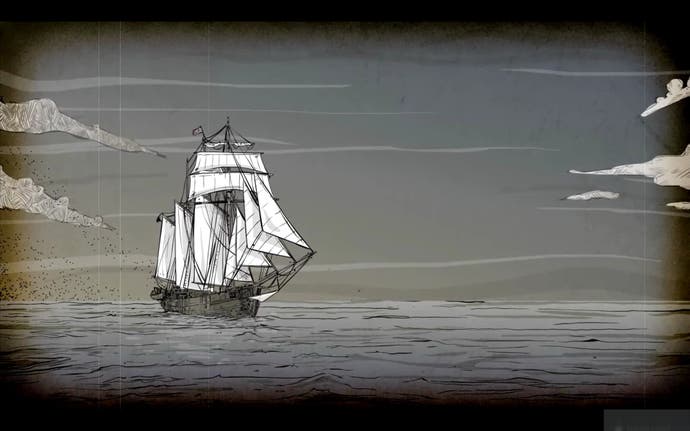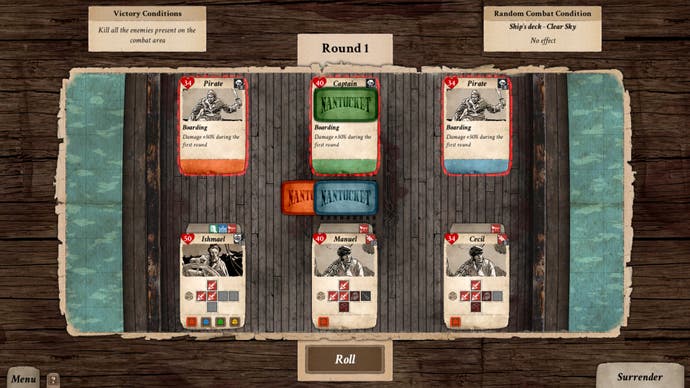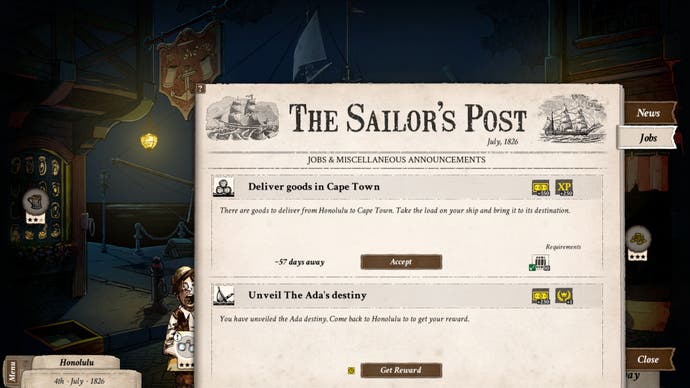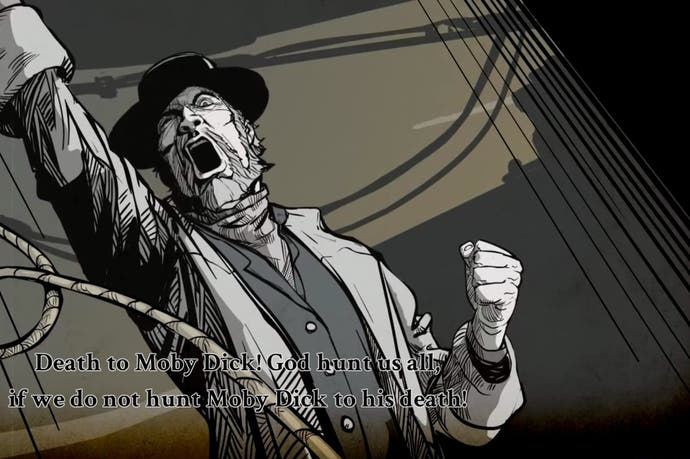My adventures in Nantucket, a game about hunting Moby Dick
Slope downwards to thy depths, o Sea.
It should not be too surprising that game designers have turned to Moby-Dick as a source of inspiration. For much of his novel, Melville is describing something that sounds a lot like an MMO.
Listen: Players band together in parties, board their ships and set off for epic hunting missions spread across the wavy blue wilds. The resource game is strong: you need enough to eat when you're out there, enough to pay the crew and keep everybody in harpoons, and you also need to make sure that the whales you kill, broken down and turned into oil on board ships which are, in essence, floating factories, will leave you in the black at the end of what might be a three-year voyage. It's all haphazardly sociable: occasionally whaling ships would cross paths out there at the edge of the world. The crews would have 'gams', instances where they all mingled and exchanged news before going their separate ways. Whaling ships would take a bag of mail before they left port on the off-chance they might meet some of the recipients while floating about. Competition was strong, but so was camaraderie.
And the stakes? The stakes could not be higher. Even before you factor in the white whale and Ahab's revenge, there's the simple fact that a lot of people relied on whale oil for lamps and for industry. Whales lit the world. Imagine if the only way to get light bulbs was to crew up and head into certain danger, hell-bent on tackling monsters? (Sounds like the sort of thing that might make a good game.)
All of which means that while I sort of disagree with the central premise of Nantucket - the idea driving the plot is that Ismael, freshly escaped from the jaws of Moby Dick would decide to head back out and hunt him all over again - the appeal is immediately obvious. Nantucket's a single-player RPG rather than an MMO, but it's still a game about getting a bunch of sailors together, clambering onto a ship, and making your fortune out there at the point of a harpoon.

And as it turns out, the central narrative - where is the white whale and what will it take to bring them down - is not crucial to the fun, or at least it did not appear to be over the course of the morning and afternoon in which I played Nantucket earlier this week. Nantucket's simple systems for recreating an entire economy and way of life out at sea means that the main quest is hardly the only story that this game is capable of telling - and the other stories I found were frequently brilliant. In truth, I pretty much forgot to hunt Moby Dick, and yet this game, ostensibly all about hunting Moby DIck, was still excellent.
You might want to think of Nantucket as a kind of ocean-going second-cousin to FTL or even Elite. You start at the titular port with a rotten ship, little money, and only the most basic of quests open to you. You load up on supplies - water and food to keep the crew healthy, grog for morale (I think it's for morale anyway), and wood to repair any damages that occur at sea - while making sure that there is room left in the hold to store any blubber you collect from hunting sea beasts. You select as many crew as will fit on your boat, and because your prestige, which controls the quality of sailors you can afford, is low at the start, you'll have to pick from a pretty sorry bunch. Then you head out to sea, timbers creaking and sails flapping.
When you're not at a port, you're exploring a huge map covering the Americas, Japan, Africa and a chunk of Europe. Quest points beckon to you - early on you are tasked with sounding out new whaling grounds or tracking down the fate of a missing ship or two - and it's a simple business to chart a course - hopefully you'll have enough resources for the time it will take to get there and back safely - and then set off. Enter the whales.
Despite a heavy emphasis on RNG, battling in Nantucket is swift and fun. You lower away for the beast you're after, and then a simple turn-based fight erupts, you against the whale or narwhal or shark or whatever it is, you rolling dice for the harpooners you've decided to take along and your enemies striking back in return. Wounds can lead to bleeding, so it's good to have a healer along for the ride, and the sea itself makes regular intrusions, laying down a different modifier every round to keep things frisky. Throughout all of this, the fiction really elevates the sense of adventure. I tend to get very tired of random encounters in most RPGs, but when it's the news of my look-out spotting a fin on the horizon and I have the chance to lower for some huge beast of the deep, the whole thing just sings a little more than it might.

The fiction elevates everything, to be honest, and it allows the interaction of some fairly straightforward systems to come together and create surprisingly tense stories. On my early missions I tended to take too many resources with me, just in case. Too much water and food, for example. Because of this, my crew started to get greedy: with so much stuff in the hold, they wanted two or three breakfasts, and they wanted to drink water all day. Should I let them race through the rations at double speed, or should I enforce order and take a hit in morale? It was a surprisingly tough choice to make, and my habit of riding around in a small, rather crap ship, meant I was always juggling resources like this. If I wasn't setting off with too much stuff, only to find that I couldn't keep any of the blubber my men were dying in order to collect, I was leaving port with too little. We'd have a hold full of blubber and a fortune ready for the taking if we could make it back to port, but the chances were good that a storm at the wrong moment might leave us days from land with nothing to eat. There is a sense throughout Nantucket of economics as a force that crushes people.
Over time, you can move through the ranks, of course. Completed quests will give you a muddle of cash, XP or prestige, allowing you to buy a bigger boat and research new tech for it, or learn new skills, or throw in with a better quality of sailor, and if you reach prestige level 25 people will start telling you rumours of Moby Dick. But you can still leave port with the wrong kind of crew - not enough harpooners, too many people with a bad attitude - and you can still overstretch yourself or have your crew doing the wrong stuff on-board. Or you can find yourself unprepared for a random disaster.
Nantucket's probably at its most Melvillean when the random stuff kicks in - and not all of it is disastrous. You'll be sailing around only to have your thoughts and shanties interrupted all of a sudden by the announcement that you've picked up a new trait just by watching a member of the crew who does something that has fascinated you: they're a great cook, perhaps, or they enjoy hanging out with non-American crew members. Elsewhere, a crew mate might fall in love with you or become racist, or both. You're always juggling your aims against the need to maintain a balance on the ship that works. Morale can plummet, xenophobia can break out. Everyone can get an STD or become cannibalistic. Whales, it seems, might be the least of it.

Simple as it is, it creates tension. Coming back to Nantucket yesterday afternoon with the wind against me, I had let an idiot steer for a while and we had damaged the hull on rocks. We'd long since run out of the wood that would allow us to repair our ship, so we were losing hull integrity second by second as heavy winds stalled our progress. Also, I'd spent so much money freeing a harpooner's friend from pirates that my own crew was offering to lend me money - a bit embarrassing seeing as I'd had sex with most of them by this point.
Later, on a supply trip to Japan I had to scrimp on food and water to make room for all the cargo we were transporting. 99 days at sea! We ran out of food and then ran out of water with fifteen days left. We drank our urine, and then a few members of the crew obligingly dropped dead and we ate them. Only I survived - where have you heard that before? - and when I reached Japan and the menu prompt said that I had told my crew - which no longer existed - to unload the cargo, I alone felt a little pang of shame.
This morning, it all came to a rather abrupt end, however. Two days out from land, a crewmember started eyeing me suspiciously. I asked to have it out with him, and he replied by telling me he knew I was short of money and he wanted to give me some. So far, so good - and typical of my captaining style, if I say so myself. The only problem was that all of my potential replies were greyed out and filled with filler text: Lorem Ipsum and all that jazz. With no way of proceeding, my whaling adventure concluded in a most unforeseen manner - for now, at least, although I am sure that I will return to Nantucket.
And to be at sea and suddenly faced with a wall of Latin nonsense? It was kind of fitting, really. Melville would be pleased - although he would probably have wanted me to find myself a better boat before heading off again.









